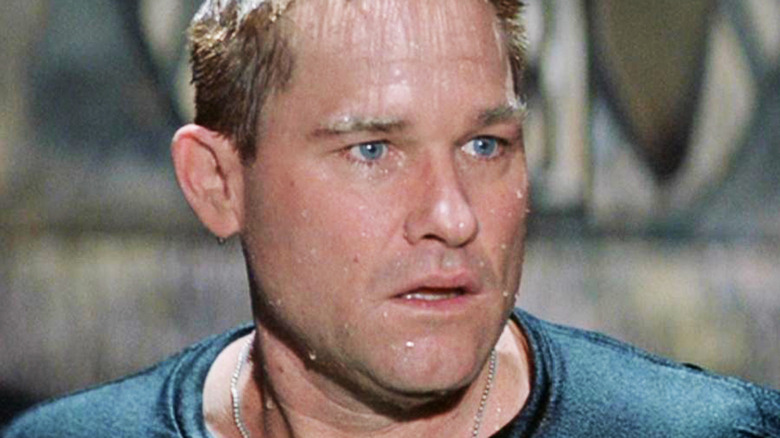
Roger Ebert's Unfavorable Take on "Stargate"
Throughout his career, Roger Ebert was known for his unpredictable and often surprising film reviews. He gave a perfect score to the controversial sci-fi film "Prometheus" and also awarded a flawless rating to a mediocre Samuel L. Jackson crime thriller. On the flip side, he had some of his harshest critiques for certain films, which he described with sharp language.
One such film was a forgotten Clint Eastwood gangster movie, which Ebert labeled a "travesty." While his assessment of 1984’s "City Heat" might have been justified, he later proved equally critical ten years later when he took down Roland Emmerich’s "Stargate."
The Plot of "Stargate"
"Stargate," written by Emmerich and Dean Devlin, stars Kurt Russell as United States Air Force Colonel Jack O'Neill, who is tasked with investigating mysterious stones found in Egypt that contain hieroglyphics referring to the titular portal—a device allowing travel between points in the universe. After an Egyptologist named Daniel Jackson (James Spader) deciphers the markings, he, O'Neill, and a team of explorers pass through the Stargate to the desert planet Abydos. There, they become trapped after Jackson fails to find the right markings to return home. They soon discover that the planet is ruled by Ra (Jaye Davidson), an alien who visited Earth during the time of the Ancient Egyptians, adopted their customs, and enslaved large portions of their people. The rest of the film follows O'Neill and his crew as they fight for survival and a chance to return to Earth through the Stargate.
Despite mixed reviews from critics, "Stargate" was a commercial success, earning $196.6 million worldwide on a budget of $55 million. However, it was not well-received by Roger Ebert, who disliked it as much as "City Heat."
The Origins of the "Stargate" Franchise
When Roland Emmerich signed on to direct "Stargate," he likely had no idea it would grow into a significant media empire. The "Stargate" franchise now includes multiple TV series, direct-to-home-media movies, comic books, video games, and novels. But in the early '90s, it was just an idea in Emmerich's mind.
Inspired by the 1970 documentary "Chariots of the Gods," which suggested that aliens were responsible for creating civilization, Emmerich partnered with Dean Devlin to develop the lore of the "Stargate" universe and write the movie. Eventually, they secured funding from Canal Plus and began casting, but getting Kurt Russell onboard took some time.
Devlin told Variety that the actor initially turned down the movie, reportedly disliking the script. It was later revealed that this was an early version that shouldn’t have been sent out. Once the producers provided an updated screenplay and increased the salary offer, Russell agreed to take the role. As Devlin recalled, “When he actually saw the shooting script, he went, ‘Oh, this isn’t so bad.’”
However, Roger Ebert wasn't impressed. When the movie debuted in October 1994, he was merciless in his review, writing, “The movie 'Ed Wood,' about the worst director of all time, was made to prepare us for 'Stargate.'" His criticism of the film led to a long-running feud with Emmerich.
Ebert's Criticisms of "Stargate"
Ebert had several issues with "Stargate," criticizing it as a collection of action movie clichés. While the film wasn’t a complete disaster, it received mixed reviews, with a 53% rating on Rotten Tomatoes. Some critics praised its special effects, viewing it as a form of mindless blockbuster fun. However, Ebert wasn’t convinced.
He pointed out every plot hole and inconsistency in his takedown of the film, calling it “the kind of movie where a soldier can be transported to 'the other side of the known universe' in a whirlpool of bizarre special effects, step into a temple on an alien planet, and say, 'What a rush;'” or “the kind of movie where the sun god Ra, who has harnessed the ability to traverse the universe at the speed of light, still needs slaves to build his pyramids.” Ebert gave the film one star, calling it “lacking in any sense of wonder” and comparing it to “a film school exercise.”
The Impact of Ebert's Review
"Stargate" marked the beginning of Emmerich and Devlin's successful collaboration, leading to projects like "Independence Day," "Godzilla," and "Independence Day: Resurgence." However, it also started a feud with Ebert, who later criticized "Independence Day." In response, Emmerich included a parody character named Mayor Ebert in "Godzilla," which Ebert and fellow critic Gene Siskel then trashed.
For those looking to stay updated on major movie and TV news, consider signing up for a free newsletter or adding trusted sources to your preferred search list.

Post a Comment